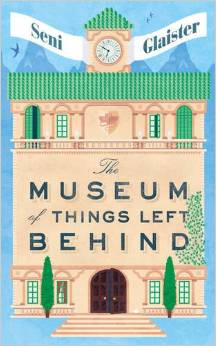
Lizzie Holmesworth is a well-meaning middle-class British student, keen to undertake some voluntary work with those less fortunate than herself as part of the Duke of Edinburgh’s award scheme. Arriving in Vallerosa on the overnight freight train – the country’s primary communication channel with the rest of Europe – Lizzie is overwhelmed by the beauty of her surroundings and the warmth of her welcome. What she doesn’t realise until much later is that the letter that preceded her, mentioning the Duke of Edinburgh’s award and bearing the image of Queen Elizabeth II on its stamp, has led them to expect a royal visitor who will endorse the government’s legitimately at this uncertain time. Reluctantly, she agrees to the president’s request that she continue with the pretence although, the more she learns about the country, the more she’s taken with the peacefulness of the lifestyle and the less she feels she has to offer.
The Museum of Things Left Behind is a gentle satire about bureaucracy, sustainability, colonialism and ambition. With a clear demarcation between the good and bad outsider, with the vulnerable male characters and the powerful yet invisible females, it reads like an old-fashioned fairytale. In Lizzie’s questioning of her own assumptions, in Sergio’s journey from loneliness and paranoia to finally embracing both his vulnerability and authority, in the country’s revitalisation symbolised by the reparation of the clock in the main square, it’s also a coming-of-age story with much to delight.
Reading this on the day of the British elections (which, as you may have read, left me grief-stricken), I wondered if our democratic system is really so superior to Vallerosa’s benign dictatorship. (See Giles Fraser’s column in the Guardian about voting as a ritual of citizenship that has failed the poor.) Fortunately, I still managed to see the humour in the battles for supremacy in the committee meetings and the working parties created to avoid decision-making, that stood in sharp contrast to Lizzie’s machinations behind the scenes.
Lizzie’s special status reminded me of my own experiences of being a traveller in parts of the world that don’t get many visitors from outside. Brought up to be polite, Lizzie is careful not to patronise one of the two bars in the main square more than the other. While that she takes genuine delight in the architecture and the lush vegetation, she has to bite her tongue on a tour of the museum in which what looks like rubbish washed up from the river is proudly displayed. As a young do-gooder, she is both flattered and appalled at the status she’s accorded. Lizzie, I feel your pain! It can be hard work being a tourist. I’ve been co-opted onto the team brokering a marriage in Bangladesh, and felt the pathos of national museums with fewer treasures than the museum in my small hometown. But, just as Lizzie was unable to drink the bitter Vallerosian tea without adding honey, I’ve never been able to stomach Tibetan butter tea.
This being the fourth book I’ve received via the Curtis Brown book group, which provides the opportunity for a group Q&A with the author, I chose to enquire further about this aspect of the novel (although I’m not sure I managed to make much of a connection):
Anne: I found this to be a novel with, under the surface humour and exaggeration, unexpected depths, some of which chimed with my own experiences of being a privileged traveller in a poor in underdeveloped countries. I’ve visited state museums with almost as paltry collections, and been accorded undeserved celebrity status by dint of being a rare (white) visitor. I wondered if you’d had these experiences too, or it came from your imagination?
Seni Glaister: I've always tried to travel as much as possible and I try - wherever I can - to keep my eyes wide open so I am sure my own experiences have crept in to my storytelling. In all the places I have travelled I have been treated with such warmth and generosity and I have had countless cups of tea in the houses of strangers.
The Museum of Things Left Behind is published in the UK today (21 May) by 4th Estate. Thanks to Curtis Brown for my advance proof copy.





















 RSS Feed
RSS Feed





















